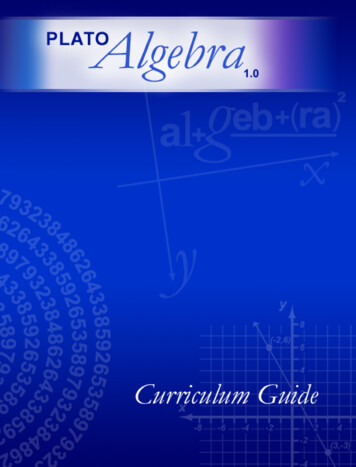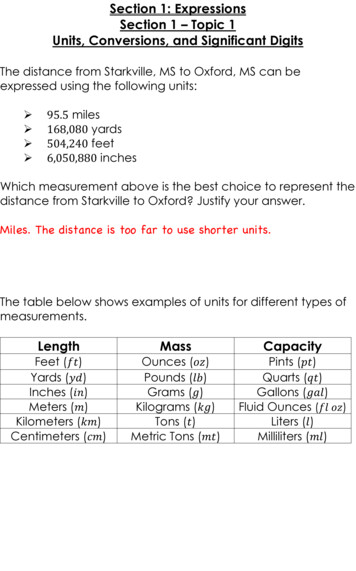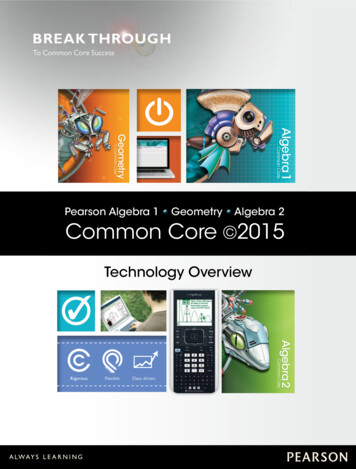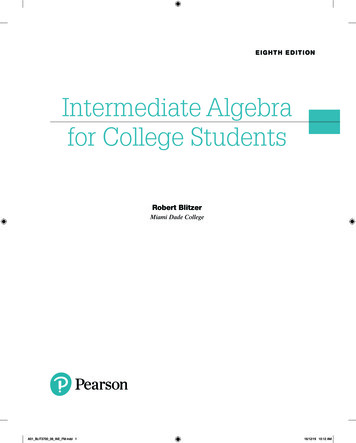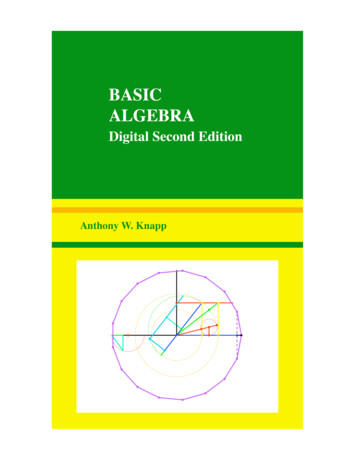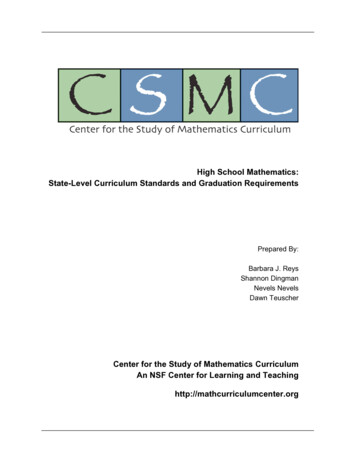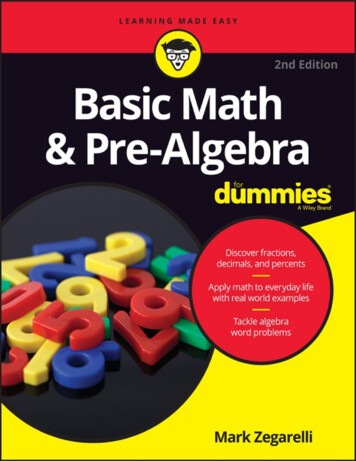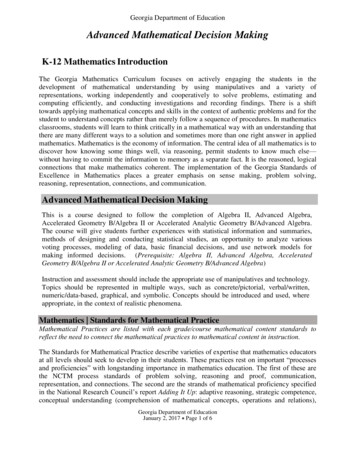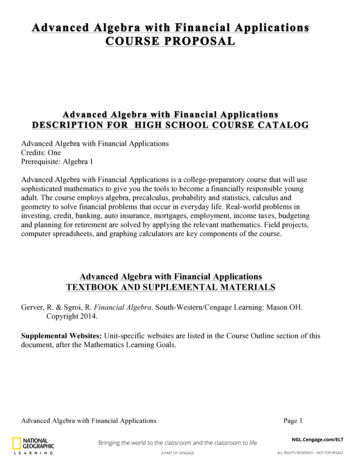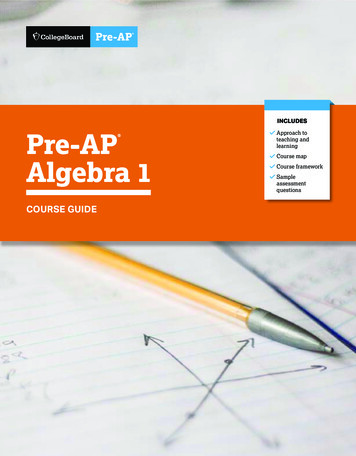
Transcription
INCLUDESPre-APAlgebra 1 COURSE GUIDEApproach toteaching andlearningCourse mapCourse frameworkSampleassessmentquestions
Pre-APAlgebra 1 COURSE GUIDEUpdated Fall 2020Please visit Pre-AP online at preap.collegeboard.org for more information and updates aboutthe course and program features.
ABOUT COLLEGE BOARDCollege Board is a mission-driven not-for-profit organization that connects students to collegesuccess and opportunity. Founded in 1900, College Board was created to expand accessto higher education. Today, the membership association is made up of over 6,000 of theworld’s leading educational institutions and is dedicated to promoting excellence and equityin education. Each year, College Board helps more than seven million students prepare fora successful transition to college through programs and services in college readiness andcollege success—including the SAT and the Advanced Placement Program . The organizationalso serves the education community through research and advocacy on behalf of students,educators, and schools.For further information, visit www.collegeboard.org.PRE-AP EQUITY AND ACCESS POLICYCollege Board believes that all students deserve engaging, relevant, and challenging gradelevel coursework. Access to this type of coursework increases opportunities for all students,including groups that have been traditionally underrepresented in AP and college classrooms.Therefore, the Pre-AP program is dedicated to collaborating with educators across the countryto ensure all students have the supports to succeed in appropriately challenging classroomexperiences that allow students to learn and grow. It is only through a sustained commitment toequitable preparation, access, and support that true excellence can be achieved for all students,and the Pre-AP course designation requires this commitment.ISBN: 978-1-4573-1504-6 2021 College Board. PSAT/NMSQT is a registered trademark of the College Board and National MeritScholarship Corporation.1 2 3 4 5 6 7 8 9 10
ContentsvAcknowledgmentsABOUT PRE-AP33Introduction to Pre-APDeveloping the Pre-AP Courses4How to Get Involved3Pre-AP Educator Network55Pre-AP Approach to Teaching and LearningFocused Content8Targeted Assessments for Learning59Horizontally and Vertically Aligned InstructionPre-AP Professional LearningABOUT PRE-AP ALGEBRA 11313Introduction to Pre-AP Algebra 1Pre-AP Mathematics Areas of Focus16Summary of Resources and Supports1518Pre-AP Algebra 1 and Career ReadinessCourse Map2020Pre-AP Algebra 1 Course FrameworkIntroduction22Big Ideas in Pre-AP Algebra 1212324333845Course Framework ComponentsOverview of Pre-AP Algebra 1 Units and Enduring UnderstandingsUnit 1: Linear Functions and Linear EquationsUnit 2: Systems of Linear Equations and InequalitiesUnit 3: Quadratic FunctionsUnit 4: Exponent Properties and Exponential Functions5152Pre-AP Algebra 1 Model LessonsSupport Features in Model Lessons5353Pre-AP Algebra 1 Assessments for LearningLearning Checkpoints56Sample Performance Task and Scoring Guidelines5562646870Performance TasksFinal ExamSample Assessment QuestionsPre-AP Algebra 1 Course DesignationAccessing the Digital Materials
AcknowledgmentsCollege Board would like to acknowledge the following committee members, consultants, andreviewers for their assistance with and commitment to the development of this course. Allindividuals and their affiliations were current at the time of their contribution.Content Development TeamGita Dev, Education Consultant, Erie, PAKathy L. Heller, Trinity Valley School, Fort Worth, TXKristin Frank, Towson University, Baltimore, MDJames Middleton, Arizona State University, Tempe, AZRoberto Pelayo, University of California, Irvine, Irvine, CAPaul Rodriguez, Troy High School, Fullerton, CAAllyson Tobias, Education Consultant, Los Altos, CAAlison Wright, Education Consultant, Georgetown, KYJason Zimba, Student Achievement Partners, New York, NYAdditional Algebra 1 Contributors and ReviewersHoward Alcosser (retired), Education Consultant, Yorba Linda, CAJames Choike, Oklahoma State University, Stillwater, OKConnor Haydon, Education Consultant, Olympia, WAAshlee Kalauli, University of California, Santa Barbara, Santa Barbara, CAJoseph Krenetsky (retired), Bridgewater-Raritan School District, Bridgewater, NJYousuf Marvi, Los Angeles Unified School District, Los Angeles, CANancy Triezenberg (retired), Granville High School, Granville, MISamantha Warrick, Los Angeles Unified School District, Los Angeles, CAYannabah Weiss, Waiakea High School, Hilo, HICOLLEGE BOARD STAFFMichael Manganello, Director, Pre-AP Mathematics Curriculum, Instruction, and AssessmentKaren Lionberger, Senior Director, Pre-AP STEM Curriculum, Instruction, and AssessmentBeth Hart, Senior Director, Pre-AP AssessmentMitch Price, Director, Pre-AP STEM AssessmentNatasha Vasavada, Executive Director, Pre-AP Curriculum, Instruction, and Assessment
About Pre-AP
About Pre-APIntroduction to Pre-APEvery student deserves classroom opportunities to learn, grow, and succeed. CollegeBoard developed Pre-AP to deliver on this simple premise. Pre-AP courses aredesigned to support all students across varying levels of readiness. They are not honorsor advanced courses.Participation in Pre-AP courses allows students to slow down and focus on the mostessential and relevant concepts and skills. Students have frequent opportunitiesto engage deeply with texts, sources, and data as well as compelling higher-orderquestions and problems. Across Pre-AP courses, students experience sharedinstructional practices and routines that help them develop and strengthen theimportant critical thinking skills they will need to employ in high school, college, andlife. Students and teachers can see progress and opportunities for growth throughvaried classroom assessments that provide clear and meaningful feedback at keycheckpoints throughout each course.DEVELOPING THE PRE-AP COURSESPre-AP courses are carefully developed in partnership with experienced educators,including middle school, high school, and college faculty. Pre-AP educator committeeswork closely with College Board to ensure that the course resources define, illustrate,and measure grade-level-appropriate learning in a clear, accessible, and engaging way.College Board also gathers feedback from a variety of stakeholders, including Pre-APpartner schools from across the nation who have participated in multiyear pilots ofselect courses. Data and feedback from partner schools, educator committees, andadvisory panels are carefully considered to ensure that Pre-AP courses provide allstudents with grade-level-appropriate learning experiences that place them on a path tocollege and career readiness.PRE-AP EDUCATOR NETWORKSimilar to the way in which teachers of Advanced Placement (AP ) courses canbecome more deeply involved in the program by becoming AP Readers or workshopconsultants, Pre-AP teachers also have opportunities to become active in theireducator network. Each year, College Board expands and strengthens the Pre-APNational Faculty—the team of educators who facilitate Pre-AP Readiness Workshopsand Pre-AP Summer Institutes. Pre-AP teachers can also become curriculum andassessment contributors by working with College Board to design, review, or pilot thecourse resources.Course Guide 2021 College Board3Pre-AP Algebra 1
About Pre-APIntroduction to Pre-APHOW TO GET INVOLVEDSchools and districts interested in learning more about participating in Pre-AP shouldvisit preap.collegeboard.org/join or contact us at preap@collegeboard.org.Teachers interested in becoming members of Pre-AP National Faculty or participatingin content development should visit preap.collegeboard.org/national-faculty orcontact us at preap@collegeboard.org.Pre-AP Algebra 14Course Guide 2021 College Board
About Pre-APPre-AP Approach to Teaching and LearningPre-AP courses invite all students to learn, grow, and succeed through focused content,horizontally and vertically aligned instruction, and targeted assessments for learning.The Pre-AP approach to teaching and learning, as described below, is not overlycomplex, yet the combined strength results in powerful and lasting benefits for bothteachers and students. This is our theory of action.Horizontally andVertically AlignedInstructionShared Principles,Areas of FocusFocused ContentCourse Frameworks,Model LessonsTargeted Assessmentsand FeedbackLearning Checkpoints,Performance Tasks,Final ExamFOCUSED CONTENTPre-AP courses focus deeply on a limited number of concepts and skills with thebroadest relevance for high school coursework and college and career success. Thecourse framework serves as the foundation of the course and defines these prioritizedconcepts and skills. Pre-AP model lessons and assessments are based directly on thisfocused framework. The course design provides students and teachers with intentionalpermission to slow down and focus.HORIZONTALLY AND VERTICALLY ALIGNED INSTRUCTIONShared principles cut across all Pre-AP courses and disciplines. Each course is alsoaligned to discipline-specific areas of focus that prioritize the critical reasoning skillsand practices central to that discipline.Course Guide 2021 College Board5Pre-AP Algebra 1
About Pre-APPre-AP Approach to Teaching and LearningSHARED PRINCIPLESAll Pre-AP courses share the following set of research-supported instructionalprinciples. Classrooms that regularly focus on these cross-disciplinary principles allowstudents to effectively extend their content knowledge while strengthening their criticalthinking skills. When students are enrolled in multiple Pre-AP courses, the horizontalalignment of the shared principles provides students and teachers across disciplineswith a shared language for their learning and investigation, and multiple opportunitiesto practice and grow. The critical reasoning and problem-solving tools studentsdevelop through these shared principles are highly valued in college coursework and inthe workplace.Close Observationand ngSHAREDPRINCIPLESAcademicConversationClose Observation and AnalysisStudents are provided time to carefully observe one data set, text, image, performancepiece, or problem before being asked to explain, analyze, or evaluate. This creates a safeentry point to simply express what they notice and what they wonder. It also encouragesstudents to slow down and capture relevant details with intentionality to support moremeaningful analysis, rather than rush to completion at the expense of understanding.Higher-Order QuestioningStudents engage with questions designed to encourage thinking that is elevatedbeyond simple memorization and recall. Higher-order questions require students tomake predictions, synthesize, evaluate, and compare. As students grapple with thesequestions, they learn that being inquisitive promotes extended thinking and leads todeeper understanding.Pre-AP Algebra 16Course Guide 2021 College Board
About Pre-APPre-AP Approach to Teaching and LearningEvidence-Based WritingWith strategic support, students frequently engage in writing coherent argumentsfrom relevant and valid sources of evidence. Pre-AP courses embrace a purposefuland scaffolded approach to writing that begins with a focus on precise and effectivesentences before progressing to longer forms of writing.Academic ConversationThrough peer-to-peer dialogue, students’ ideas are explored, challenged, and refined.As students engage in academic conversation, they come to see the value in beingopen to new ideas and modifying their own ideas based on new information. Studentsgrow as they frequently practice this type of respectful dialogue and critique and learnto recognize that all voices, including their own, deserve to be heard.AREAS OF FOCUSSocial StudiesScienceMathematicsArtsEnglishThe areas of focus are discipline-specific reasoning skills that students developand leverage as they engage with content. Whereas the shared principles promotehorizontal alignment across disciplines, the areas of focus provide vertical alignmentwithin a discipline, giving students the opportunity to strengthen and deepen theirwork with these skills in subsequent courses in the same discipline.Areas of FocusAlign Vertically Within Disciplines(Grades 6-12)Academic ConversationHigher-Order QuestioningEvidence-Based WritingClose Observation and AnalysisShared PrinciplesAlign Horizontally Across All CoursesFor information about the Pre-AP mathematics areas of focus, see page 13.Course Guide 2021 College Board7Pre-AP Algebra 1
About Pre-APPre-AP Approach to Teaching and LearningTARGETED ASSESSMENTS FOR LEARNINGPre-AP courses include strategically designed classroom assessments that serve astools for understanding progress and identifying areas that need more support. Theassessments provide frequent and meaningful feedback for both teachers and studentsacross each unit of the course and for the course as a whole. For more informationabout assessments in Pre-AP Algebra 1, see page 53.Pre-AP Algebra 18Course Guide 2021 College Board
About Pre-APPre-AP Professional LearningThe summer before their first year teaching a Pre-AP course, teachers are requiredto engage in professional learning offered by College Board. There are two optionsto meet this requirement: the Pre-AP Summer Institute (Pre-APSI) and the OnlineFoundational Module Series. Both options provide continuing education units toeducators who complete the training. The Pre-AP Summer Institute is a four-day collaborative experience that empowersparticipants to prepare and plan for their Pre-AP course. While attending, teachersengage with Pre-AP course frameworks, shared principles, areas of focus, andsample model lessons. Participants are given supportive planning time where theywork with peers to begin to build their Pre-AP course plan. The Online Foundational Module Series will be available beginning July 2020 toall teachers of Pre-AP courses. These 12- to 20-hour courses will support teachersin preparing for their Pre-AP course. Teachers will explore course materials andexperience model lessons from the student’s point of view. They will also beginto plan and build their own course materials, so they are ready on day one ofinstruction.Pre-AP teachers also have access to the Online Performance Task Scoring Modules,which offer guidance and practice applying Pre-AP scoring guidelines to student work.Course Guide 2021 College Board9Pre-AP Algebra 1
About Pre-APAlgebra 1
About Pre-AP Algebra 1Introduction to Pre-AP Algebra 1The Pre-AP Algebra 1 course is designed to deepen students’ understanding of linearrelationships by emphasizing patterns of change, multiple representations of functionsand equations, modeling real world scenarios with functions, and methods for findingand representing solutions of equations and inequalities. Taken together, these ideasprovide a powerful set of conceptual tools that students can use to make sense of theirworld through mathematics.Rather than seeking to cover all topics traditionally included in a standard algebratextbook, this course focuses on the foundational algebraic knowledge and skills thatmatter most for college and career readiness. The Pre-AP Algebra 1 Course Frameworkhighlights how to guide students to connect core ideas within and across the units ofthe course, promoting a coherent understanding of linear relationships.The components of this course have been crafted to prepare not only the nextgeneration of mathematicians, scientists, programmers, statisticians, and engineers,but also a broader base of mathematically informed citizens who are well equipped torespond to the array of mathematics-related issues that impact our lives at the personal,local, and global level.PRE-AP MATHEMATICS AREAS OF FOCUSThe Pre-AP mathematics areas of focus, shown below, are mathematical practicesthat students develop and leverage as they engage with content. They were identifiedthrough educator feedback and research about where students and teachers needthe most curriculum support. These areas of focus are vertically aligned to themathematical practices embedded in other mathematics courses in high school,including AP, and in college, giving students multiple opportunities to strengthen anddeepen their work with these skills throughout their educational career. They alsosupport and align to the AP Calculus Mathematical Practices, the AP Statistics CourseSkills, and the mathematical practices listed in various state standards.Engagement nticity ofAmong MultipleApplications andRepresentationsMathematicsModelingAreas of FocusCourse Guide 2021 College Board13Pre-AP Algebra 1
About Pre-AP Algebra 1Introduction to Pre-AP Algebra 1Greater Authenticity of Applications and ModelingStudents create and use mathematical models to understand and explain authenticscenarios.Mathematical modeling is a process that helps people explore, represent, analyze, andexplain the world. In Pre-AP Algebra 1, students explore real-world contexts wheremathematics can be used to make sense of a situation. They engage in the modelingprocess by making choices about what aspects of the situation to model, assessing howwell the model represents the available data, drawing conclusions from their model,justifying decisions they make through the process, and identifying what the modelhelps clarify and what it does not.In addition to mathematical modeling, Pre-AP Algebra 1 students engage in mathematicsthrough authentic applications. Applications are similar to modeling problems in thatthey are drawn from real-world phenomena, but they differ because the applicationsdictate the appropriate mathematics to use to solve the problem. Pre-AP Algebra 1balances these two types of real-world tasks.Engagement in Mathematical ArgumentationStudents use evidence to craft mathematical conjectures and prove or disprove them.Conjecture and proof lie at the heart of the discipline of mathematics. Mathematicsis both a way of thinking and a set of tools for solving problems. Pre-AP Algebra 1students gain experience, comfort, and proficiency with mathematical thinkingby observing and generalizing patterns in number sequences, graphs, equations,operations, and functions. They harness their curiosity to create problems to solveand conjectures to prove or disprove. Through mathematical argumentation, studentslearn how to be critical of their own reasoning and the reasoning of others.Connections Among Multiple RepresentationsStudents represent mathematical concepts in a variety of forms and move fluentlyamong the forms.Mathematical concepts can be represented in a variety of forms. Pre-AP Algebra 1students learn how the multiple representations of a concept are connected to eachother and how to fluently translate between graphical, numerical, algebraic, and verbalrepresentations. Every mathematical representation illuminates certain characteristicsof a concept while also obscuring other aspects. With experience that begins todevelop in Pre-AP Algebra 1, students develop a nuanced understanding of whichrepresentations best serve a particular purpose.Pre-AP Algebra 114Course Guide 2021 College Board
About Pre-AP Algebra 1Introduction to Pre-AP Algebra 1PRE-AP ALGEBRA 1 AND CAREER READINESSThe Pre-AP Algebra 1 course resources are designed to expose students to a widerange of career opportunities that depend upon Algebra 1 knowledge and skills.Examples include not only field-specific careers such as mathematician or statisticianbut also other endeavors where algebraic knowledge is relevant and applicable, such asactuaries, engineers, programmers, carpenters, and HVAC technicians.Career clusters that involve mathematics, along with examples of careers inmathematics and other careers that require the use of algebra, are provided below.Teachers should consider discussing these with students throughout the year topromote motivation and engagement.Career Clusters Involving Mathematicsarts, A/V technology, and communicationsarchitecture and constructionbusiness management and administrationfinancegovernment and public administrationhealth scienceinformation technologymanufacturingmarketingSTEM (science, technology, engineering, and math)Examples of Mathematics CareersExamples of Algebra 1 Related Careersactuaryfinancial analystmathematicianmathematics puter programmereconomistelectricianengineerHVAC technicianoperations research analystprogrammerSource for Career Clusters: “Advanced Placement and Career and Technical Education: Working Together.”Advance CTE and the College Board. October 2018. ther.For more information about careers that involve mathematics, teachers and studentscan visit and explore the College Board’s Big Future s/math-statistics-mathematics.Course Guide 2021 College Board15Pre-AP Algebra 1
About Pre-AP Algebra 1Introduction to Pre-AP Algebra 1SUMMARY OF RESOURCES AND SUPPORTSTeachers are strongly encouraged to take advantage of the full set of resources andsupports for Pre-AP Algebra 1, which is summarized below. Some of these resourcesmust be used for a course to receive the Pre-AP Course Designation. To learn moreabout the requirements for course designation, see details below and on page 68.COURSE FRAMEWORKIncluded in this guide as well as in the Pre-AP Algebra 1 Teacher Resources, theframework defines what students should know and be able to do by the end of thecourse. It serves as an anchor for model lessons and assessments, and it is the primarydocument teachers can use to align instruction to course content. Use of the courseframework is required. For more details see page 20.MODEL LESSONSTeacher resources, available in print and online, include a robust set of model lessonsthat demonstrate how to translate the course framework, shared principles, and areas offocus into daily instruction. Use of the model lessons is encouraged but not required.For more details see page 51.LEARNING CHECKPOINTSAccessed through Pre-AP Classroom (the Pre-AP digital platform), these shortformative assessments provide insight into student progress. They are automaticallyscored and include multiple-choice and technology-enhanced items with rationalesthat explain correct and incorrect answers. Use of one learning checkpoint per unit isrequired. For more details see page 53.PERFORMANCE TASKSAvailable in the printed teacher resources as well as on Pre-AP Classroom,performance tasks allow students to demonstrate their learning through extendedproblem-solving, writing, analysis, and/or reasoning tasks. Scoring guidelines areprovided to inform teacher scoring, with additional practice and feedback suggestionsavailable in online modules on Pre-AP Classroom. Use of each unit’s performancetask is required. For more details see page 55.PRACTICE PERFORMANCE TASKSAvailable in the student resources, with supporting materials in the teacher resources, thesetasks provide an opportunity for students to practice applying skills and knowledge as theywould in a performance task, but in a more scaffolded environment. Use of the practiceperformance tasks is encouraged but not required. For more details see page 55.Pre-AP Algebra 116Course Guide 2021 College Board
About Pre-AP Algebra 1Introduction to Pre-AP Algebra 1FINAL EXAMAccessed through Pre-AP Classroom, the final exam serves as a classroom-based,summative assessment designed to measure students’ success in learning and applyingthe knowledge and skills articulated in the course framework. Administration of thefinal exam is encouraged but not required. For more details see page 62.PROFESSIONAL LEARNINGBoth the four-day Pre-AP Summer Institute (Pre-APSI) and the Online FoundationalModule Series support teachers in preparing and planning to teach their Pre-APcourse. All Pre-AP teachers are required to either attend the Pre-AP SummerInstitute or complete the module series. In addition, teachers are required tocomplete at least one Online Performance Task Scoring module. For more details seepage 9.Course Guide 2021 College Board17Pre-AP Algebra 1
UNIT 1Course MapLinear Functionsand LinearEquations 45 Class PeriodsPre-AP model lessons provided forapproximately 55% of instructionaltime in this unitPLANThe course map shows how components are positioned throughoutthe course. As the map indicates, the course is designed to be taughtover 140 class periods (based on 45-minute class periods), for a totalof 28 weeks.KEY CONCEPT 1.1Constant Rate of Change and SlopeModel lessons are included for approximately 50% of the totalinstructional time, with the percentage varying by unit. Each unit isdivided into key concepts.Linear FunctionsTEACHLearning Checkpoint 1The model lessons demonstrate how the Pre-AP shared principlesand mathematics areas of focus come to life in the classroom.Shared PrinciplesClose observation and analysisHigher-order questioningEvidence-based writingAcademic conversationKEY CONCEPT 1.3Linear EquationsKEY CONCEPT 1.4Linear Models of NonlinearScenariosAreas of FocusGreater authenticity of applications and modelingEngagement in mathematical argumentationConnections among multiple representationsLearning Checkpoint 2KEY CONCEPT 1.5ASSESS AND REFLECTEach unit includes two learning checkpoints and a performance task.These formative assessments are designed to provide meaningfulfeedback for both teachers and students.Note: The final exam, offered during a six-week window in the spring,is not represented in the map.Pre-AP Algebra 1KEY CONCEPT 1.218Two-Variable Linear InequalitiesPerformance Task for Unit 1Course Guide 2021 College Board
UNIT 2Systems ofLinear Equationsand Inequalities 25 Class PeriodsPre-AP model lessons provided forapproximately 30% of instructionaltime in this unitKEY CONCEPT 2.1UNIT 3QuadraticFunctions 45 Class PeriodsPre-AP model lessons provided forapproximately 45% of instructionaltime in this unitKEY CONCEPT 3.1UNIT 4ExponentProperties andExponentialFunctions 25 Class PeriodsPre-AP model lessons provided forapproximately 40% of instructionaltime in this unitKEY CONCEPT 4.1The Solution to a System ofEquationsFunctions with a Linear Rate ofChangeExponent Rules and PropertiesKEY CONCEPT 2.2KEY CONCEPT 3.2KEY CONCEPT 4.2Solving a System of LinearEquations AlgebraicallyThe Algebra and Geometry ofQuadratic FunctionsRoots of Real NumbersKEY CONCEPT 2.3Learning Checkpoint 1Learning Checkpoint 1KEY CONCEPT 3.3KEY CONCEPT 4.3Solving Quadratic EquationsSequences with MultiplicativePatternsKEY CONCEPT 2.4KEY CONCEPT 3.4KEY CONCEPT 4.4Systems of Linear InequalitiesModeling with Quadratic FunctionsExponential Growth and DecayLearning Checkpoint 2Learning Checkpoint 2Learning Checkpoint 2Performance Task for Unit 2Performance Task for Unit 3Performance Task for Unit 4Modeling with Systems of LinearEquationsLearning Checkpoint 1Course Guide 2021 College Board19Pre-AP Algebra 1
About Pre-AP Algebra 1Pre-AP Algebra 1 Course FrameworkINTRODUCTIONBased on the Understanding by Design (Wiggins and McTighe) model, the Pre-APAlgebra 1 Course Framework is back mapped from AP expectations and aligned toessential grade-level expectations. The course framework serves as a teacher’s blueprintfor the Pre-AP Algebra 1 instructional resources and assessments.The course framework was designed to meet the following criteria: Focused: The framework provides a deep focus on a limited number of conceptsand skills that have the broadest relevance for later high school, college, and careersuccess. Measurable: The framework’s learning objectives are observable and measurablestatements about the knowledge and skills students should develop in the course. Manageable: The framework is manageable for a full year of instruction, fostersthe ability to explore concepts in depth, and enables room for additional local orstate standards to be addressed where appropriate. Accessible: The framework’s learning objectives are designed to provide allstudents, across varying levels of readiness, with opportunities to learn, grow, andsucceed.Pre-AP Algebra 120Course Guide 2021 College Board
About Pre-AP Algebra 1Pre-AP Algebra 1 Course FrameworkCOURSE FRAMEWORK COMPONENTSThe Pre-AP Algebra 1 Course Framework includes the following components:Big IdeasThe big ideas are recurring themes that allow students to create meaningfulconnections between course concepts. Revisiting the big ideas throughout thecourse and applying them in a variety of contexts allows students to develop deeperconceptual understandings.Enduring UnderstandingsEach unit focuses on a small set of enduring understandings. These are the long-termtakeaways related to the big ideas that leave a lasting impression on students. Studentsbuild and earn these understandings over time by exploring and applying coursecontent throughout the year.Key ConceptsTo support teacher planning and instruction, each unit is organized by key concepts.Each key concept includes relevant learning objectives and essential knowledgestatements and may also include content boundary and cross connection statements.These are illustrated and defined below.About Pre-AP Algebra 1Pre-AP Algebra 1 Course FrameworkLearning Objectives:These objectivesdefine what a studentneeds to be able todo with essentialknowledge to progresstoward the enduringunderstandings. Thelearning objectivesserve as actionabletargets for instructionand assessment.KEY CONCEPT 1.4: LINEAR MODELS OF NONLINEAR SCENARIOSLearning ObjectivesStudents will be able to Essential KnowledgeStudents need to know that .1.4.1 Interpret a graphical representation of apiecewise linear function in context.1.4.1a A piecewise linear function consists of two or more linearfunctions, each restricted
ABOUT PRE-AP ALGEBRA 1 13 Introduction to Pre-AP Algebra 1 13 Pre-AP Mathematics Areas of Focus 15 Pre-AP Algebra 1 and Career Readiness 16 Summary of Resources and Supports 18 Course Map 20 Pre-AP Algebra 1 Course Framework 20 Introduction 21 Course Framework Components 22 Big Ideas in Pre-AP Algebra 1 23 Ov
